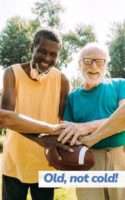Let’s picture this: You’re listening to music on full blast while doing the dishes and in walks your dad and he starts dancing to the beat. My face fell straight to the floor from embarrassment, and I laughed out loud. I thought to myself, “Why is the old man, trying to be all young, hip and happening? He should be relaxing, not dancing.”
Another scenario: A neighbour calls you to help her with something on her phone. You sigh and think, “Why do older people not just let some things go; they’re old anyway. I have things to do.”
Do you feel that at times that we as younger people do treat a person a certain way because of their age? I certainly think we do; it’s embedded in who we are because of how we are socialised by our parents, and society at large. For instance, it would be odd to treat a five-year-old as anything but a five-year-old right?
But let’s be honest, older people are humans too. They were also young at one stage in their lives and them doing something like dance or learning something new is nothing to be ashamed about; it’s human nature.
This brings us to ageism. According to the World Health Organization (WHO), “Ageism refers to the stereotypes (how we think), prejudice (how we feel) and discrimination (how we act) towards others or oneself based on age.”
The WHO also stated that half the world’s population is ageist against older people.
To find out more about what it is like to be treated as an older and grown woman, Dorothy, 56, shares her experience with us:
- Tell us about a time when you were discriminated against because of your age.
I don’t really have a concrete example of being discriminated against. However, I know that if applying for a job in the future, for example, my age will probably count against me! Friends my age have struggled to find work, with employers often preferring younger people.
- At what age did you first start to experience ageism?
This one is hard to answer! For me being a woman is very linked to it. When I was young I don’t think I was taken as seriously as younger men – perhaps because they spoke with more confidence than me. And now as an older woman, I do feel that I am somewhat invisible – without the authority perhaps of an older man.
- Do you think ageism has something to do with grey/ white hair or wrinkles? And/ or what is it about the old that makes people prejudiced against them?
People definitely associate age with grey hair. My friend who doesn’t look particularly old went grey early and was sometimes mistaken for her children’s grandmother! (You can imagine this wasn’t great for her!)
Perhaps in the past older people were the holders of wisdom, of society’s knowledge, and so were asked for advice and given respect. But now, our are lives dominated by technology. And new technology all the time. So older people are certainly not the experts anymore – in fact, they are the opposite, as it can feel harder to learn these new things compared to younger people who are familiar with this digital age. So instead of being the wise and revered, we are the ones who are mocked for our lack of knowledge!
- Do you feel age is just a number? Do you feel your age?
I do think age is just a number. I get surprised to see myself as an older person in the mirror or on photos. I realise how when I was younger I overlooked older people myself and didn’t realise they were people with full lives too!
- Do you think an older person should be treated a specific way?
I think it would be good for people to recognise that often experience can bring wisdom and so listen to what older people say. But I don’t think older people should be treated that differently… I think everyone needs to be respected and valued, old, young, rich poor…
Age is just a number
You know, I think age is just a number too. I’m 25, yet I’d sometimes forget and think I’m 18. I’m not sure whether I look 18 or not but I feel it a lot of the time. And it doesn’t help that my family still refer to me as a girl despite being a woman.
I think we are all guilty of ageism, whether that be to younger or older folk.
Should we be worried about ageism? According to the WHO we should be: “Ageism can change how we view ourselves, can erode solidarity between generations, can devalue or limit our ability to benefit from what younger and older populations can contribute, and can impact our health, longevity and well-being while also having far-reaching economic consequences.”
“I don’t believe in age, it’s just a number. I believe in energy. Don’t let age dictate what you can and cannot do.” – Toa Porchon-Lynch
***
Tell us: Do you think that age is just a number? Why or why not?
Read more here on self-care.


